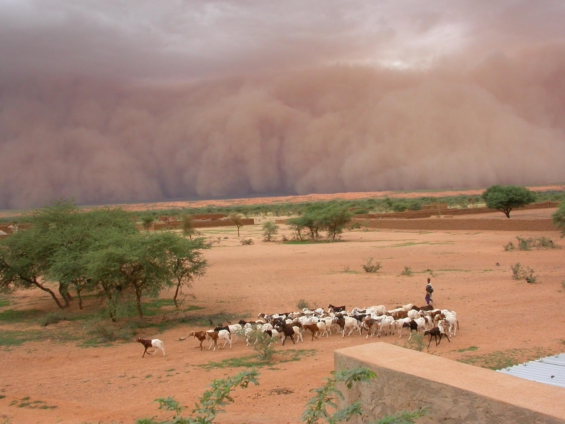"The ozone layer is on track to recover within four decades, with the global phaseout of ozone-depleting chemicals already benefitting efforts to mitigate climate change."
This is the conclusion reached by an expert panel supported by the UN, which was announced on Monday at the 103rd annual meeting of the American Meteorological Society. The panel examined cutting-edge technologies like geoengineering for the first time and issued a warning about unintended consequences for the ozone layer.
The ozone layer has been successfully protected by the phase-out of nearly 99% of banned ozone-depleting substances, according to the UN-backed Scientific Assessment Panel to the Montreal Protocol on Ozone Depleting Substances quadrennial assessment report, which is published every four years.
This has resulted in a notable recovery of the ozone layer in the upper stratosphere and a reduction in human exposure to dangerous ultraviolet (UV) rays from the sun.
"If current policies remain in place, the ozone layer is expected to recover to 1980 values (before the appearance of the ozone hole) by around 2066 over the Antarctic, by 2045 over the Arctic and by 2040 for the rest of the world. Variations in the size of the Antarctic ozone hole, particularly between 2019 and 2021, were driven largely by meteorological conditions. Nevertheless, the Antarctic ozone hole has been slowly improving in area and depth since the year 2000."
“That ozone recovery is on track according to the latest quadrennial report is fantastic news. The impact the Montreal Protocol has had on climate change mitigation cannot be overstressed. Over the last 35 years, the Protocol has become a true champion for the environment,” said Meg Seki, Executive Secretary of the United Nations Environment Programme’s Ozone Secretariat.
“The assessments and reviews undertaken by the Scientific Assessment Panel remain a vital component of the work of the Protocol that helps inform policy and decision-makers about climate change effects.”
The positive effect that the treaty has already had on the climate is reaffirmed in the 10th edition of the Scientific Assessment Panel. The Kigali Amendment to the Montreal Protocol, a separate 2016 agreement, mandates a phase-down in the production and consumption of some hydrofluorocarbons (HFCs).
HFCs are potent climate change gases, even though they do not directly reduce ozone. According to the Scientific Assessment Panel, this amendment is expected to prevent warming by 0.3 to 0.5°C by 2100. (this does not include contributions from HFC-23 emissions).
“Ozone action sets a precedent for climate action. Our success in phasing out ozone-eating chemicals shows us what can and must be done – as a matter of urgency – to transition away from fossil fuels, reduce greenhouse gases and so limit temperature increase,” said WMO Secretary-General Prof. Petteri Taalas.
A large international group of experts, including many from the World Meteorological Organization (WMO), United Nations Environment Programme (UNEP), National Oceanic and Atmospheric Administration (NOAA), National Aeronautics and Space Administration (NASA), and European Commission, have based the most recent assessment on extensive studies, research, and data.
Geoengineering
The Scientific Assessment Panel examined the potential effects on ozone of stratospheric aerosol injection, or the deliberate addition of aerosols into the stratosphere, for the first time (SAI). The use of SAI has been suggested as a potential strategy to lessen global warming by increasing solar reflection.
Yet the panel cautions that unintended consequences of SAI “could also affect stratospheric temperatures, circulation and ozone production and destruction rates and transport.”
Latest Stories
-
Latif Iddrisu vrs IGP & AG: State Attorney fails to show up again even after initial pledge
16 minutes -
Supreme Court grants NDC and candidates extra time to respond to EC in election case
28 minutes -
Morocco U-17 set for crucial clash against Zambia in AFCON Group A
36 minutes -
63 Nsawam Prison inmates earn degrees from UCC
54 minutes -
KNUST student allegedly killed by lover to be buried this weekend
1 hour -
Finance Minister commits to timely release of funds for School Feeding caterers
1 hour -
I wanted to be a rapper – Yvonne Nelson
1 hour -
Address issues affecting teachers by April 30 – GNAT tells govt
1 hour -
Lands Minister calls on institutions to play their roles effectively in galamsey fight
1 hour -
More funds as government uncaps DACF, allocates money for Assemblymembers
1 hour -
I can’t afford to disappoint President Mahama – Prof Kobby Mensah
1 hour -
Absa Bank launches She Business to offer GH¢2m in collateral-free loans to women entrepreneurs
2 hours -
Akorfala: Celestine Donkor’s latest song features Diana Hamilton
2 hours -
Deloitte Africa member firms unite to celebrate ‘Earth Month 2025’
2 hours -
Newly recruited teachers from Colleges of Education demand payment of 7 months ‘ salary arrears
3 hours

